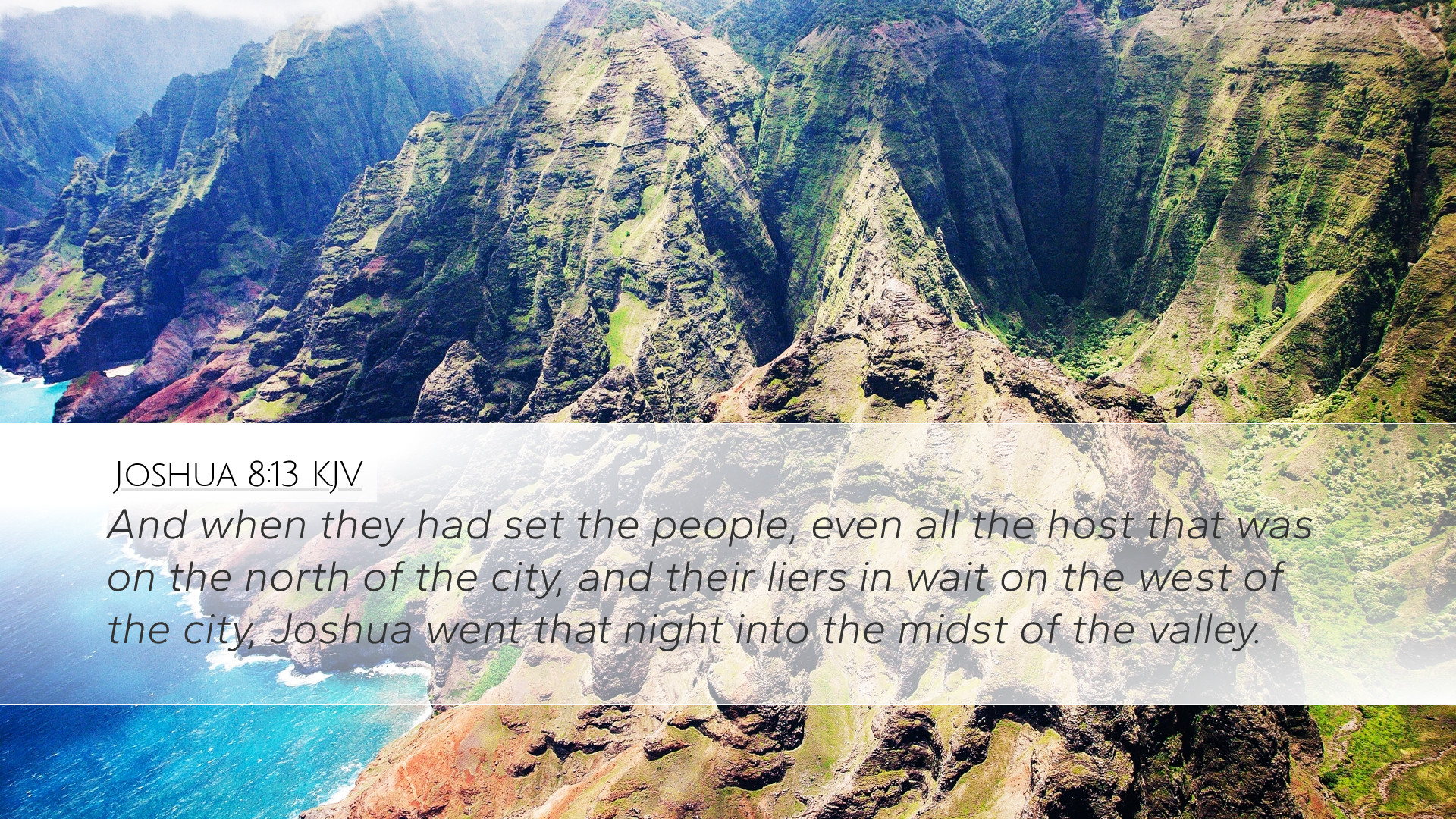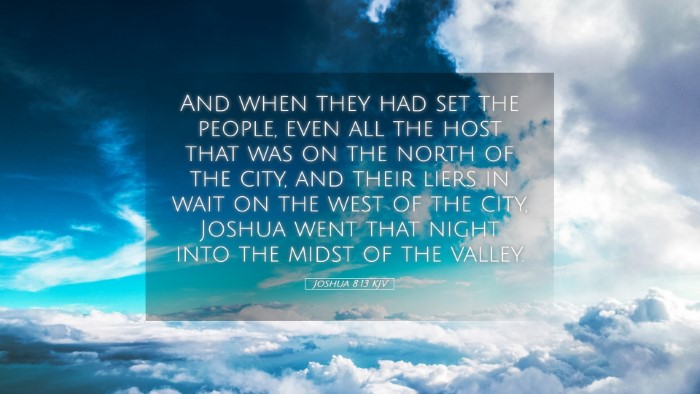Commentary on Joshua 8:13
Text of Joshua 8:13 (ESV): "And all the sons of Israel, they took their positions to the north of the city, and the ones to the south of the city. But Joshua spent that night in the valley."
Introduction
The narrative of Joshua 8:13 plays a critical role in understanding the military strategy and theological significance of Israel's conquest of Canaan. The verses depict the strategic movement of the Israelite army, showcasing their discipline and obedience to God's commands. This commentary draws insights from several public domain sources, including Matthew Henry, Albert Barnes, and Adam Clarke, to provide a comprehensive understanding of this pivotal moment.
The Setting of the Passage
Prior to the events of Joshua 8, we witness the defeat at Ai due to Achan's sin (Joshua 7). After rectifying the sin and following God’s directions, the Israelites prepare for a renewed attack on Ai. The strategic positioning in verse 13 reflects not only military acumen but also spiritual readiness as the Israelites seek divine favor.
Positions of the Israelites
- North and South Flanks: The placement of troops to the north and south of Ai symbolizes complete encirclement, suggesting that no escape route is left for the enemy. This tactic reflects the theological assertion that God guides His people in battle and grants them victory when they are aligned with His will.
- Obedience to God: As Matthew Henry notes, the success of Israel's military ventures depended heavily on their adherence to God's commands. Their positioning was not random; it stemmed from divine instruction. Each Israelite made the choice to obey, which resulted in a unified front against the adversary.
The Role of Joshua
Joshua's actions and decisions here are paramount. He acts as a faithful leader, embodying trust in God's promises. According to Adam Clarke, Joshua's leadership is characterized by both action and a reliance on God’s faithfulness. His decision to spend the night in the valley reflects a posture of humility and dependence on God’s guidance.
Theological Insights
The events in Joshua 8:13 can be examined through various theological lenses that are relevant for pastors, theologians, and scholars.
Divine Providence and Human Agency
As Albert Barnes points out, the perfect combination of divine providence and human action is evident in this passage. The Israelites prepare for battle, but their success ultimately rests on God’s sovereignty. For contemporary believers and leaders, this serves as a reminder of the importance of prayer and reliance on divine aid while taking tangible steps toward fulfilling God's mission.
Symbolism of the Valley
The valley is a significant metaphor. It represents both humility and the place of encounter with God. Joshua’s decision to stay in the valley symbolizes reliance on prayer and reflection before the impending battle. Matthew Henry comments that the valley can further serve as a place of spiritual preparation, where leaders must seek God’s wisdom before engaging in difficult challenges.
Spiritual Warfare
In the broader context of spiritual warfare, Joshua's positioning of the troops is analogous to the church's modern-day call to be vigilant and prepared against spiritual adversaries. The Apostle Paul’s exhortations in Ephesians 6 about the armor of God draw parallels to the preparation Joshua undertook—highlighting the ongoing need for believers to be spiritually equipped.
Conclusion
The richness of Joshua 8:13 extends beyond its immediate military implications to profound lessons on faith, leadership, and spiritual preparedness. By understanding the strategic positions of the Israelites and Joshua's role as a leader who seeks God's assistance diligently, leaders today can glean essential principles for spiritual leadership and ministry. As we evaluate our positions in relation to the battles we face, may we always look to God for guidance and strength.
Reflection Questions
- What does the positioning of the Israelites teach us about obedience and unity in the church today?
- How can we ensure that we are spiritually prepared like Joshua before facing challenges?
- In what ways can we cultivate a deeper reliance on God in our decision-making processes?


